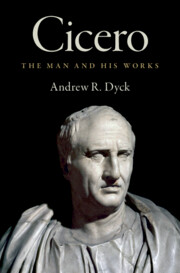Book contents
- Cicero
- Cicero
- Copyright page
- Dedication
- Contents
- Maps
- Abbreviations
- Introduction
- A Note on Sources
- Chapter 1 An Orator’s Education (106–80)
- Chapter 2 Orator 2.0 (79–71)
- Chapter 3 The “Reluctant” Prosecutor (70)
- Chapter 4 A “New Man” Rising (69–64)
- Chapter 5 Piloting the Ship of State on an Optimate Course (January–August 63)
- Chapter 6 Crisis Management (September–December 63)
- Chapter 7 The Aftermath of the “Annus Mirabilis” (62)
- Chapter 8 Seeking Shelter in the Past as Storm Clouds Gather (61–59)
- Chapter 9 To the Abyss and Back (58 to Early September 57)
- Chapter 10 Resurgence and Deflation (September 29, 57, to the End of April 56)
- Chapter 11 Strategies for Coping (May 56 to the End of 54)
- Chapter 12 Political Realities, Theoretical Constructs (The End of 54 to Mid-51)
- Chapter 13 Away from Rome (Mid-51–47)
- Chapter 14 Reclaiming a Voice (46)
- Chapter 15 Devastation and Recovery (January to Mid-45)
- Chapter 16 From Theory to Practice (Mid-45 through March 44)
- Chapter 17 A New Struggle Looms (April–December 44)
- Chapter 18 The Final Struggle (43)
- Chapter 19 Conclusion: An Intellectual between Tradition and Power
- Appendices
- References
- Index of Greek Words and Phrases
- Index of Latin Words and Phrases
- Index of Passages Discussed
- Index of Cicero’s Works Discussed
- Subject Index
- Index of Proper Names
- Cicero
- Cicero
- Copyright page
- Dedication
- Contents
- Maps
- Abbreviations
- Introduction
- A Note on Sources
- Chapter 1 An Orator’s Education (106–80)
- Chapter 2 Orator 2.0 (79–71)
- Chapter 3 The “Reluctant” Prosecutor (70)
- Chapter 4 A “New Man” Rising (69–64)
- Chapter 5 Piloting the Ship of State on an Optimate Course (January–August 63)
- Chapter 6 Crisis Management (September–December 63)
- Chapter 7 The Aftermath of the “Annus Mirabilis” (62)
- Chapter 8 Seeking Shelter in the Past as Storm Clouds Gather (61–59)
- Chapter 9 To the Abyss and Back (58 to Early September 57)
- Chapter 10 Resurgence and Deflation (September 29, 57, to the End of April 56)
- Chapter 11 Strategies for Coping (May 56 to the End of 54)
- Chapter 12 Political Realities, Theoretical Constructs (The End of 54 to Mid-51)
- Chapter 13 Away from Rome (Mid-51–47)
- Chapter 14 Reclaiming a Voice (46)
- Chapter 15 Devastation and Recovery (January to Mid-45)
- Chapter 16 From Theory to Practice (Mid-45 through March 44)
- Chapter 17 A New Struggle Looms (April–December 44)
- Chapter 18 The Final Struggle (43)
- Chapter 19 Conclusion: An Intellectual between Tradition and Power
- Appendices
- References
- Index of Greek Words and Phrases
- Index of Latin Words and Phrases
- Index of Passages Discussed
- Index of Cicero’s Works Discussed
- Subject Index
- Index of Proper Names
Summary
Cicero can be viewed either as a historical actor or as a figure of Latin culture. The former, inevitably, dominates the historical narratives of the period. Over time, a law of diminishing returns sets in as the earliest assessments by writers who were personally familiar with Cicero and/or the institutions and politics of the republic give way to an imperial mindset that focuses on the role models of the “good emperor” on the one hand and the “good courtier” on the other. These categories, retrojected not without distortion to the late republic, then become the basis of interpretation.
Information
- Type
- Chapter
- Information
- CiceroThe Man and His Works, pp. 11 - 22Publisher: Cambridge University PressPrint publication year: 2025
